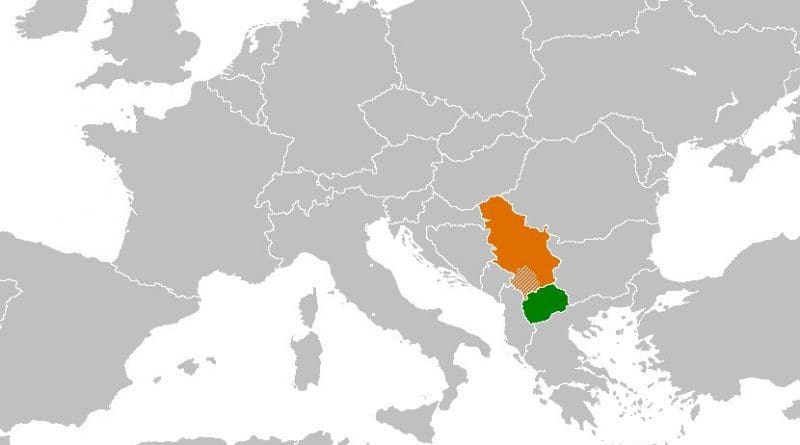Serbia, Macedonia FMs Pledge To Resolve Intelligence Dispute
By Maja Zivanovic
The Serbian and Macedonian Foreign Ministers, Ivica Dacic and Nikola Dimitrov, met in Nis to discuss the intelligence that prompted Serbia recently to recall its embassy staff from Macedonia – and vowed to work on improved relations.
Foreign Ministers Dacic and Dimitrov confirmed at a joint press conference in the Serbian town of Nis on Friday that Serbia had come across intelligence that had the potential to cause instability and damage both to Serbia and Macedonia.
“Our findings provoked our reaction. We wanted to avoid the possibility of causing damage to our relations and of Serbia being falsely accused of provoking unrest or destabilization in Macedonia,” Dacic said after meeting Dimitrov on Friday in the Serbian southern city.
Dacic added that all the information should be checked and resolved through dialogue.
“We [Serbia and Macedonia] are friends, and should be careful not to be drawn into global political games,” the Serbian Foreign Minister said.
Macedonia’s Foreign Minister Dimitrov told the media that the subject of intelligence remained “delicate” generally.
“I think that getting into too many details on an intelligence activity would lead us in the wrong direction, both Serbia and Macedonia,” Dimitrov said, adding that Macedonia’s government was not involved in the diplomatic incident.
Dacic and Dimitrov agreed that the Serbian and Macedonian intelligence services should cooperate closely, and added that two countries will remain in friendly relations, as both have same goal, which is EU membership.
Serbian diplomats returned to their embassy in Skopje on Thursday, while the Foreign Ministry announced that the Serbian ambassador would return on August 31.
The ministry added that immediately on his return the ambassador would seek a meeting with Macedonian Prime Minister Zoran Zaev.
Meanwhile, Serbia’s President, Aleksandar Vucic, and Macedonia’s Prime Minister, Zaev, agreed on Wednesday in a long telephone conversation to improve recently tense relations through more dialogue.
Vucic announced that the Serbian Prime Minister, Ana Brnabic, will ask Zaev to hold a joint session of the two governments in Belgrade.
On Monday, Vucic said Serbia had pulled out its embassy staff after Belgrade obtained “evidence of very offensive intelligence against the institutions of Serbia” adding that unnamed “foreign powers” were also involved.
Serbian media reports speculated that Macedonia had been tapping the Serbian officials’ communications.
But Zaev told the Serbian daily Blic on Wednesday that allegations in the Serbian media that he or his government had ordered wiretapping, or other intelligence measures, against the Serbian embassy in Skopje, were false.
Serbian Prime Minister Brnabic on Wednesday repeated that “intelligence was the concrete reason for withdrawing of the embassy staff” from Skopje.
Media reports have speculated that one of the factors in the diplomatic incident was a Serbian intelligence officer, Goran Zivaljevic, who worked as an adviser at the Serbian embassy.
Zivaljevic was present during a violent episode on April 27, when a group of men stormed the Macedonian parliament in Skopje.
Zivaljevic told Serbia’s Tanjug news agency on August 23 that he had the approval of Macedonian authorities to be in the chamber that night – which the office of Macedonian President Gjorge Ivanov denied.
The Macedonian television station Telma on Friday said that prosecutors might start an investigation to determine any connections of either Ivanov and Zivaljevic with the violent events in the parliament, the Sobranje.
The European Parliament rapporteur for Serbia, David McAllister, on Friday told Radio Free Europe that he was surprised by the disputes between Macedonia and Serbia, adding that he had got assurances from Serbia that the dispute would be solved.

